"Staying Power: Concrete, Not Wood" is a multigenre production by youths in Ypsilanti, Mich., and Richmond, Calif.

On Saturday, Dec. 7, a cohort of teen artist-activists from Ypsilanti, Michigan, and Richmond, California -- collectively known as Staying Power -- will put on a multigenre production that will culminate a year-long cultural exchange program between teens from these two communities.
"Staying Power: Concrete, Not Wood" will blend original poetry, music, theater, and film to stage conversations around gentrification and housing injustice experienced across the U.S, centering the voices and vision of youth of color who are using their art to create change.
Jua’Chelle Harmon, 17, is one of Staying Power's participants and below she reflects on what the project and poetry mean to her.
Regrets, He's Had a Few: Former Wolverine and NFL wide receiver Braylon Edwards is forever "Doing It My Way"
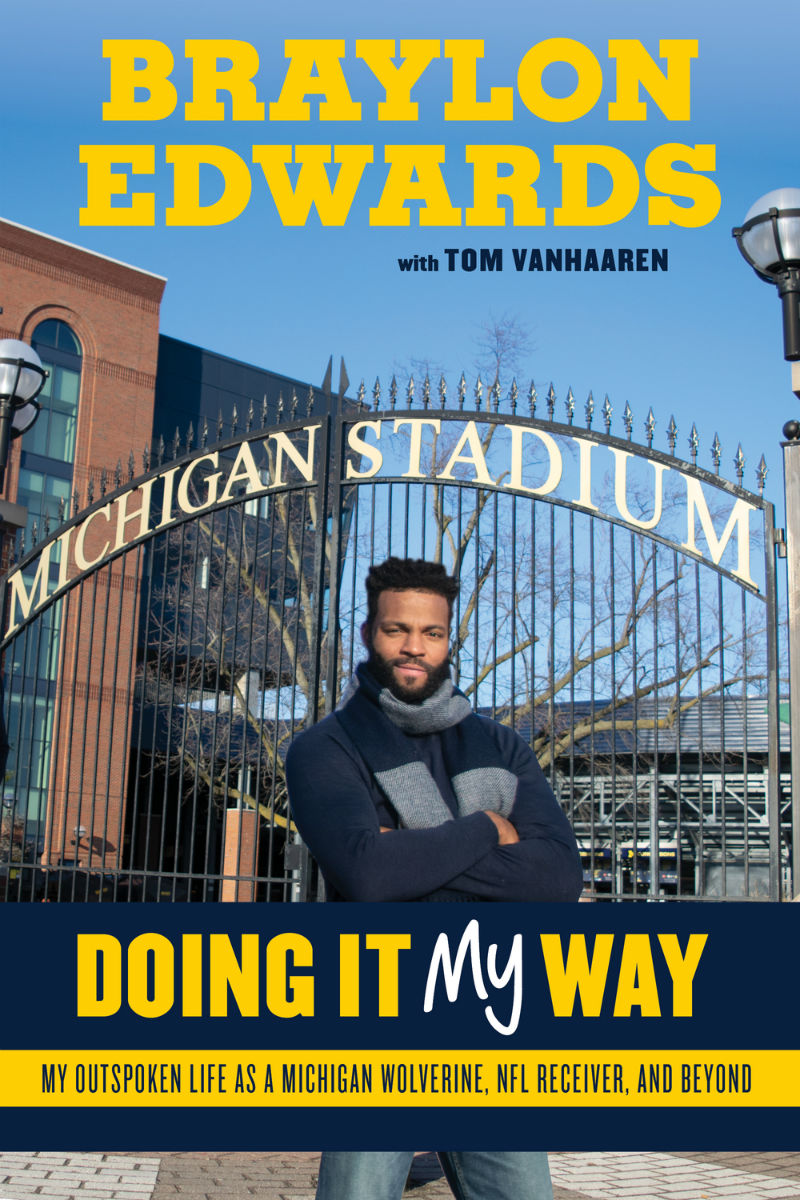
Former University of Michigan All American wide receiver and NFL Pro Bowler Braylon Edwards has a reputation for being outspoken, to say the least. But even so, he had to warm up to the idea of writing Doing It My Way: My Outspoken Life as a Michigan Wolverine, NFL Receiver, and Beyond.
“Triumph Books, my publishing company, originally approached me in 2017,” Edwards said. “I had no idea what my book would be about, and to be honest, at the time, the money was laughable. … So we said, ‘We’ll pass.’ And by we, I mean me and my mother. She’s my business manager, so I run everything by her. But as we started telling people that I was presented with this opportunity -- my aunties, my uncles, my cousins, my coaches, my friends, everybody -- I started to think there enough things I’ve gone through in my life that make my story unique.”
This included constantly traveling between two sets of parents as a child; being a “legacy” athlete since Edward’s father, Stan Edwards, played football for Michigan under Bo Schembechler; the ups and downs of Edwards’ football career, both at Michigan and in the NFL; and his struggles off the field, including his battles with drug use, anxiety, and depression.
“It became evident that the book should happen -- that this was something we should definitely sign up for,” Edwards said. “So when [Triumph] came back to us in 2018, I didn’t care so much about the money. It was more about my story out there. … People forget that there’s more to athletes than a helmet, or a golf club, or lacrosse sticks -- especially now, with social media and fantasy sports. It’s like no one cares about athletes anymore. It’s all about, ‘What can you do for me?’”
Edwards wrote Doing It My Way with ESPN’s Tom VanHaaren. And while you might assume that Edwards felt a bit nervous and vulnerable when his highly personal book debuted in September, that’s not the case.
In "Find Me," author André Aciman resumes the stories of characters from "Call Me by Your Name"
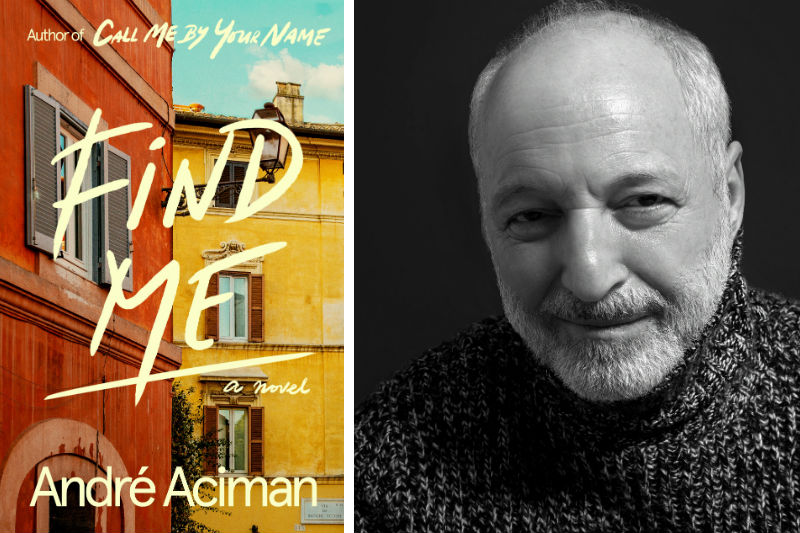
How do we know if we are fully living our lives? Does asking that question mean that we are not?
Find Me by André Aciman is a novel obsessed with these questions. Its characters find such great love that they feel as though they had not been living previously. This book also continues the stories of Elio and Oliver, among other characters, which first appeared in Call Me by Your Name, Aciman’s 2007 novel. While reading Call Me by Your Name before Find Me would provide helpful background, you can enjoy Find Me without having read the other book, as I read Find Me first for this interview with Aciman and then Call Me by Your Name after.
Aciman is a professor at the Graduate Center of the City University of New York and lives with his wife in Manhattan. He will be in conversation with Zahir Janmohamed and also answer audience questions at Rackham Auditorium at the University of Michigan Saturday, November 9, at 7 pm in a ticketed event by Literati Bookstore.
In the four-parted Find Me, the first section focuses on Samuel, who is Elio’s father and receives a bigger role than in the previous book. On the topic of whether someone is truly living, Samuel reflects, “Some of us never jumped to the next level. We lost track of where we were headed and as a result stayed where we started.” As he interacts with Miranda, a woman he meets on a train, he muses about embracing life and how conversely, “Perhaps going about one’s daily life with all its paltry joys and sorrows is the surest way of keeping true life at bay.” This concern becomes not only a call to action and attention for Samuel as he comes to this awareness while his relationship with Miranda simultaneously grows, but also a theme as other characters reconsider their lives in subsequent parts of the novel.
The next three sections of Find Me center on other characters -- Elio, Oliver, and Elio again -- in their first-person voices, and they pick up what has happened in their lives since Call Me by Your Name. The subject of how to live gains more nuance as those characters discuss who they have been, who they are now, and how they have changed over time. Michel, Elio’s lover, says to him, “I suspect we have first selves and second selves and perhaps third, fourth, and fifth selves and many more in between.” He recognizes how, at different times and places in life, we are different people, and then later we are no longer those people. This concept becomes especially poignant between Elio and Oliver.
Not only do people evolve during their lives but they also reveal unique parts of themselves in different relationships and situations. As Samuel says to Miranda, “Most of us never meet those who’ll understand our full rounded self. I show people only that sliver of me I think they’ll grasp. I show others other slices. But there’s always a facet of darkness I keep to myself.” Find Me is also clearly preoccupied with who we are and how we know -- and are known to -- others.
The events and musings of characters in Find Me expose the situational nature of relationships and also embrace intensity and sensuality, though it may be hard to believe the ways and speed in which relationships progress. Fate plays somewhat of a role in bringing characters together, but the novel suggests that the characters’ choices and desires have a bigger effect on their lives. At so many points in the relationship between Samuel and Miranda, or Elio and Oliver, someone chooses or chooses not to say something, or they get scared and bolt. Yet, they discover a greater life when following their desires.
Aciman answered some questions from me before his visit to Ann Arbor.
Fifth Avenue Press celebrates the release of 9 new books on November 10
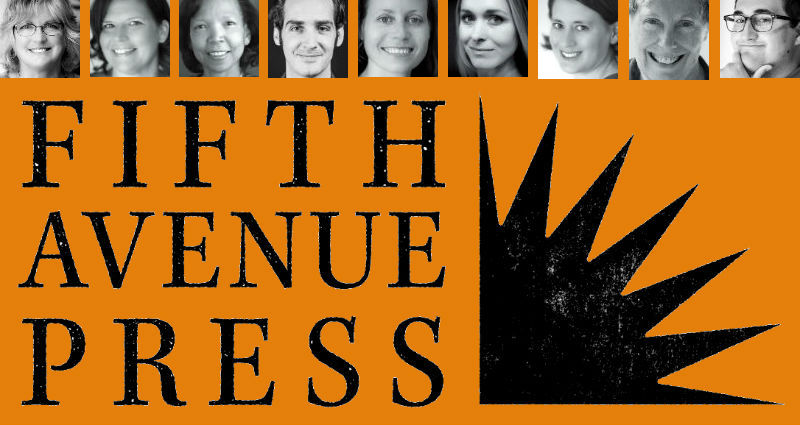
The Ann Arbor District Library's Fifth Avenue Press celebrates the release of its latest batch of books with a release reception at the downtown branch on Sunday, November 10, at 1 pm.
AADL cardholders can download PDF copies of the books here; print copies for most titles will be on sale at the reception.
To read interviews with the other authors, click on the book titles below:
➥ The Elements: A Love Letter to All Things Everywhere written and illustrated by Hannah Burr
➥ Intersections by Shanelle Boluyt
➥ All That We Encounter by Bethany Grey
➥ Shape Notes by Judy Patterson Wenzel
➥ Fantastic Planet: Modern Crab Adventures written and illustrated by Douglas Bosley
➥ Over in Motown by Debbie Taylor, with illustrations by Keisha Morris
➥ The Dragon Library by James Barbatano, with illustrations by Douglas Bosley
➥ Breaking Through by Johnny Thompson
➥ The Planet We Live On by Shanda Trent
Poet and U-M writing instructor Molly Spencer sees the world "as a collection of thresholds" in her new book, "If the house"
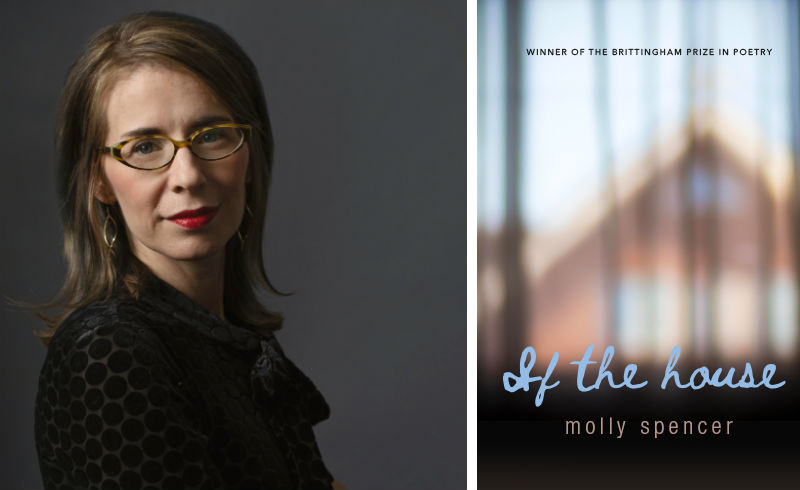
Throughout Molly Spencer’s new book of poetry, If the house, each measured word reveals the intensities and scenes of home, time, and solitary experience amidst people and relationships. In a poem titled “How to Love the New House,” there is a line that answers, “Until you ache with it.” Another poem, “As if life can go on as it has,” includes the sentence, “The earth has all these endings,” and the speaker goes on to share, “I am / in a kitchen’s heavy afternoon / light,” almost implying that the sun could indicate a conclusion.
Perhaps most consistently, the passage of seasons prominently delineates time in If the house. Early on, a stanza depicts time’s effects through apples and squash:
Given time, they will ripen,
grow sweet, become something
for you to get by on.
It seems that time offers sufficient sustenance to keep going and also that time keeps independently moving, resulting in byproducts like sweetening. Later, the lines, “It’s December” and then “October and the birds flock / and rise, whole-cloth” appear in different poems. So months also mark time in this collection, along with other indicators, such as, “My body / adds itself again to the unfolding / rooms of time,” and there are “...other Augusts far / from here, but not so far you can’t / reel them back in....” Each moment is clearly fixed to others by virtue of time being linear, but life in this poetry collection’s world still changes and shifts, showing contrasts to previous points in time to which the speaker remains connected.
Turn and Face the Strange: Cartoonist Casey Nowak's big life changes have invigorated her art
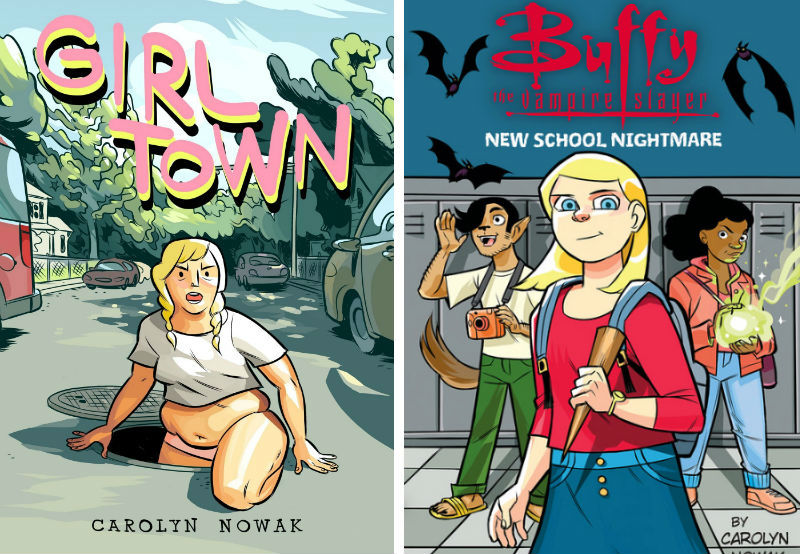
The two years since Casey Nowak last answered questions for Pulp have been filled with personal changes and critical success. Followers of Nowak’s on Twitter may also have noticed her using the platform to discuss her own experiences with sexuality, divorce, mental health, and recently a series of tweets discussing her name change from Carolyn to Casey.
The Ann Arbor cartoonist feels these experiences, both good and bad, have influenced and increased her confidence in her work.
In late 2018, Top Shelf released Nowak’s collection of short stories, Girl Town. These previously released stories, along with one unpublished work, secured Nowak some of her best critical reactions to date. Girl Town finished the year on numerous “Best of” lists, was nominated for an Eisner Award (akin to comics' Academy Award), and last month won Nowak her third Ignatz Award, which recognizes excellence among self-published or small-press creators.
Previously, Nowak had an acclaimed 12-issue run as the artist for the popular series Lumberjanes, and in 2017 she published Chad Agamemnon, an all-original comic for the Ann Arbor District Library's annual Ann Arbor Comic Arts Festival (A2CAF). (AADL cardholders can download the comic here.)
Nowak has also released the first two volumes of her middle-grade Buffy the Vampire Slayer series and ventured into erotic comics with the release of No Better Words, which also scored an Eisner nomination for the cartoonist. Earlier this year, Nowak started a Patreon site, which allows fans to subscribe at various tiers to gain access to exclusive content from Nowak including works in progress and exclusive mini-comics like last month’s Duh! Ha-Ha!
Nowak was kind enough to answer a few emailed questions for Pulp.
Paul Bernstein’s debut book of poetry, "What the Owls Know," chronicles a fully lived life

A blurb on the back of What the Owls Know, Paul Bernstein’s book of poetry, says that the reader is guided through the “ground of a fully lived life.” There is no question that Bernstein’s life, like his poems, is fully realized.
Born in New York, Bernstein came to Ann Arbor in 1959 and returned to the city in the late 1960s seeking a Ph.D. in History. “I first published my writing while an undergraduate,” Bernstein says. “But then I got involved in politics. … I was involved with anti-war politics and at some point thought that I should give it up to focus on writing poetry but then protests heated up, the Weathermen began … and I realized it was not the time to get out.”
Eileen Pollack's "The Professor of Immortality" novel explores science, tech, grief, motherhood, whether we can truly know another person -- and the Unabomber's time in Ann Arbor

The Professor of Immortality by Eileen Pollack is preoccupied with how well people can know each other and how they deal with flaws and surprises in relationships when they care about the other person. The book raises questions about whether it is better to be together despite challenges and what the costs are either way. The ending seems to point strongly to an answer yet still lets the reader wrestle with this matter.
Main character Professor Maxine Sayers has an energizing job, loving husband, quirky child, and comfortable home -- until she doesn’t. Her husband dies unexpectedly, and then she experiences issues with her existing family members as her son becomes inaccessible and her mother’s health deteriorates. Through all of these changes and problems, the novel delves into Maxine’s thoughts and feelings about the goings-on. She must contend with whether what she believed and worked for is right and if it is what she still wants.
As Maxine takes action to figure out is transpiring with her son and a former student, she reflects deeply on her life and connections to people. At one point while talking with a friend and colleague, Rosa, Maxine wonders how to cope with her concerns, and she experiences some relief from Rosa:
[Rosa] settles beside Maxine and rubs her back until Maxine is crying in her arms. That’s all anyone wants, isn’t it? To be held? Isn’t that the best Terror Management System any of us has devised?
This passage feels poignant in and of itself and becomes even more weighty with the fact that the book draws inspiration from Ted Kaczynski, the Unabomber. Another character, Angelina, provides further insight, noting that for many, “‘…their troubles are because of what is missing in their lives. And there is no way you could make up for that.’” These insights buoy Maxine when she faces what she fears is true and makes difficult decisions as a mother.
Pollack previously directed the MFA Program in Creative Writing at the University of Michigan (U-M), and she has written numerous books, including the recent novel, The Bible of Dirty Jokes. Now she lives in New York City. Ann Arbor welcomes her back Friday, October 11, at 7 pm at Literati Bookstore, where she’ll be in conversation with author Natalie Bakopoulos. I asked her some questions beforehand.
Brittney Morris' "Slay" imagines Black Panther's Wakanda as a VR video game beset by trolls

A lot can happen in 11 days. One of the original Apollo missions could have gone to the moon and back. The Pony Express could have delivered one piece of mail from Missouri to California. A turtle can walk from New York to Ohio. And the most anticipated YA novel of the fall can be written!
After seeing Black Panther, Brittney Morris penned her debut book, Slay, a story about a young African-American woman who battles a real-life internet troll intent on ruining the video game she created, also called Slay.
“After I saw the movie, I was hoping someone would make a Wakanda simulator video game," Morris says, "because I immediately wanted to go back to Wakanda, and then I got to thinking about how controversial an all-Nubian VR MMO would be. I realized how much responsibility would be on the shoulders of someone managing such a game. And thus, the idea for Slay was born.”
Beer captivates and divides a family in J. Ryan Stradal's new Midwestern saga, "The Lager Queen of Minnesota"

Beer and pie remain constant for characters through rifts, tragedies, and changes in J. Ryan Stradal’s new book, The Lager Queen of Minnesota. The novel follows two sisters, Helen and Edith, as they come of age and make lives for themselves. Yet their paths diverge when Helen taps their father for all the money from the sale of the family farm, which divides the family. Edith becomes known for her pies, hops between service industry jobs, and endures several major losses, all while bottling her feelings about the uneven inheritance. Helen pores over chemistry and learns to make beer in college, and then she grows a large, successful brewery with the help of the farm proceeds. When Edith’s granddaughter, Diana, inadvertently enters the beer business, their paths head toward each other again.
Chapters in this plot-driven yet poignant novel alternate the focus between characters and are titled by various sums of money exchanged within them. The backstory and present lives of the three female main characters are blended throughout the chapters as Diana’s story parallels Helen’s in some ways. It is not only about what is happening or has happened, though. The novel also lingers on nostalgic or emotional moments. When Edith loses her husband, Stanley, the narrator describes that:
Her grief was a forest with no trails, and she couldn’t guess how long her heart would walk through it, as her body walked other places. For half a century, she had seen or spoken with this man almost every day, so his life didn’t end when he died; it found its way into cereal aisles and intersections and post office lines and conversations she didn’t intend.
It’s clear that Edith cares deeply about those around her even as she struggles to get by.
The characters don’t succumb to bitterness despite challenges to support themselves, and they celebrate their successes in an industry that fluctuates based on consumers’ preferences. Beer aficionados and foodies might appreciate the well-crafted descriptions of brewing methods and tasting notes. One passage describes “Grandma Edith’s Rhubarb-Pie-In-A-Bottle” ale as such:
The beer has a fluffy pink two-finger head and smells like malty rhubarb, so it’s certainly not out to fool anybody. ... This beer is flawed, wonderful, and strange in a way only a certain individual could devise, and it renders every other beer on the shelf a faceless SKU.
This review of her beer illustrates Edith’s and other characters’ work ethics and distinct Midwestern traits.
Stradal has first-hand knowledge of the setting, as he grew up in Minnesota. He now lives in Los Angeles and is a contributing editor at TASTE, an online magazine about food and cooking. His first novel is Kitchens of the Great Midwest. He reads at Literati Bookstore on Tuesday, September 24, at 7 pm, and I interviewed him ahead of time.


































